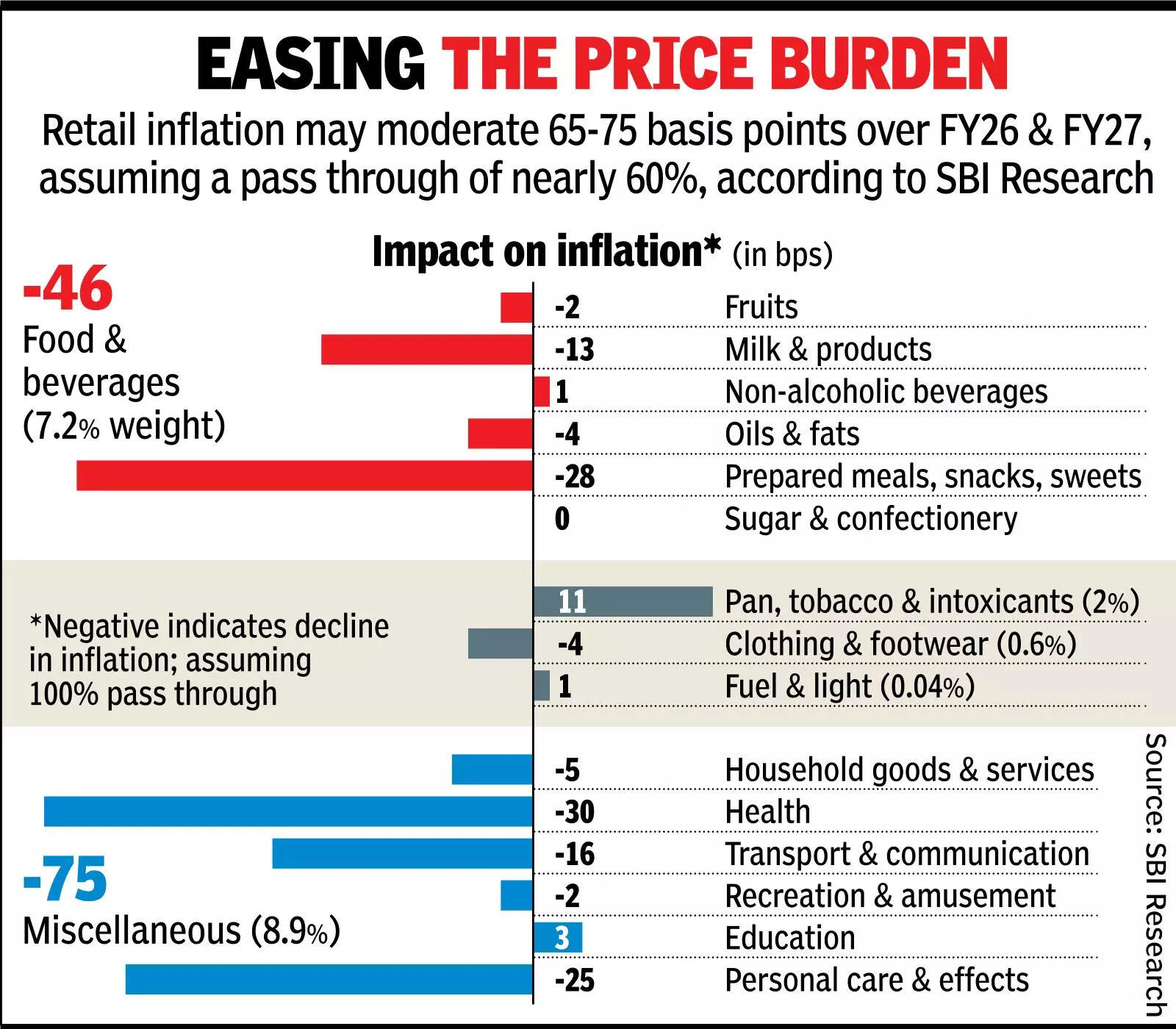 MUMBAI: India Inc will see a “meaningful” impact on its earnings from the second half of this fiscal as new GST rates kick in from the last week of this month, ushering in a new phase of growth. The rates will result in higher volumes and lower costs for businesses, especially those benefiting from GST 2.0. This could also improve margins, giving companies’ more room to reinvest and expand. The move will stimulate demand, ease inflation, improve ease of doing business, and partially counter the adverse effects of US trade tariffs.RIL, the nation’s top earner, will see a positive impact on its retail business as GST rates on most items of mass consumption get slashed. However, its oil and gas exploration unit’s operational costs will rise due to higher tax, compressing margins. On the bright side, its solar power division will see lower costs as GST rates on renewable energy devices are reduced. Retail forms a major part of RIL’s earnings.In Q1 of this fiscal, India Inc’s total revenue grew 4-6%, fuelled by pharma, telecom, organised retail, aluminium, and airline sectors. Industries like power, coal, IT services, and steel, however, slowed down overall growth, said Crisil in a July 28 note.
MUMBAI: India Inc will see a “meaningful” impact on its earnings from the second half of this fiscal as new GST rates kick in from the last week of this month, ushering in a new phase of growth. The rates will result in higher volumes and lower costs for businesses, especially those benefiting from GST 2.0. This could also improve margins, giving companies’ more room to reinvest and expand. The move will stimulate demand, ease inflation, improve ease of doing business, and partially counter the adverse effects of US trade tariffs.RIL, the nation’s top earner, will see a positive impact on its retail business as GST rates on most items of mass consumption get slashed. However, its oil and gas exploration unit’s operational costs will rise due to higher tax, compressing margins. On the bright side, its solar power division will see lower costs as GST rates on renewable energy devices are reduced. Retail forms a major part of RIL’s earnings.In Q1 of this fiscal, India Inc’s total revenue grew 4-6%, fuelled by pharma, telecom, organised retail, aluminium, and airline sectors. Industries like power, coal, IT services, and steel, however, slowed down overall growth, said Crisil in a July 28 note. RIL posted a profit of Rs 30,783 crore in Q1. SBI followed with Rs 21,627 crore, then HDFC Bank at Rs 16,258 crore, and ICICI Bank with Rs 13,558 crore. The insurance arms of these three banks, along with LIC, which ranked sixth in profit (Rs 10,957 crore in Q1), might increase their insurance premiums even though life and health insurance are exempted from GST.Tata Motors, ranked 12th in earning charts, and second in the Tata Group after TCS (Rs 12,760 crore profit in Q1) will see a positive effect on its car and truck sales due to lower GST rates. Other Tata entities like Trent, Indian Hotels (which manages Ginger budget chain), Voltas, and Tata Consumer Products are also set to gain. Indian Hotels might see a smaller benefit because it has fewer owned budget hotels. About 15% of Tata Consumer’s portfolio will benefit from the new GST rates.“GST 2.0 will have a meaningful impact on companies’ earnings, with early signs appearing in Q3,” said Mehta Securities’ Prashanth Tapse. “While demand might pick up, profits could still be tight as companies are likely to pass benefits onto customers. Input costs remain sticky or trend higher, posing margin concerns.”Adani Group’s cement and solar energy businesses will see lower production costs due to the elimination of coal cess and a reduction in GST on renewable energy equipment from 12% to 5%. For Adani Cement, which heavily uses local coal, the “removal of Rs 400 per tonne coal cess will result in overall savings, outweighing any potential loss from GST incentives”, said CEO Vinod Bahety.
RIL posted a profit of Rs 30,783 crore in Q1. SBI followed with Rs 21,627 crore, then HDFC Bank at Rs 16,258 crore, and ICICI Bank with Rs 13,558 crore. The insurance arms of these three banks, along with LIC, which ranked sixth in profit (Rs 10,957 crore in Q1), might increase their insurance premiums even though life and health insurance are exempted from GST.Tata Motors, ranked 12th in earning charts, and second in the Tata Group after TCS (Rs 12,760 crore profit in Q1) will see a positive effect on its car and truck sales due to lower GST rates. Other Tata entities like Trent, Indian Hotels (which manages Ginger budget chain), Voltas, and Tata Consumer Products are also set to gain. Indian Hotels might see a smaller benefit because it has fewer owned budget hotels. About 15% of Tata Consumer’s portfolio will benefit from the new GST rates.“GST 2.0 will have a meaningful impact on companies’ earnings, with early signs appearing in Q3,” said Mehta Securities’ Prashanth Tapse. “While demand might pick up, profits could still be tight as companies are likely to pass benefits onto customers. Input costs remain sticky or trend higher, posing margin concerns.”Adani Group’s cement and solar energy businesses will see lower production costs due to the elimination of coal cess and a reduction in GST on renewable energy equipment from 12% to 5%. For Adani Cement, which heavily uses local coal, the “removal of Rs 400 per tonne coal cess will result in overall savings, outweighing any potential loss from GST incentives”, said CEO Vinod Bahety.

GST rationalisation: Higher sales, lower costs to rev up India Inc’s H2 profits
- September 5, 2025
